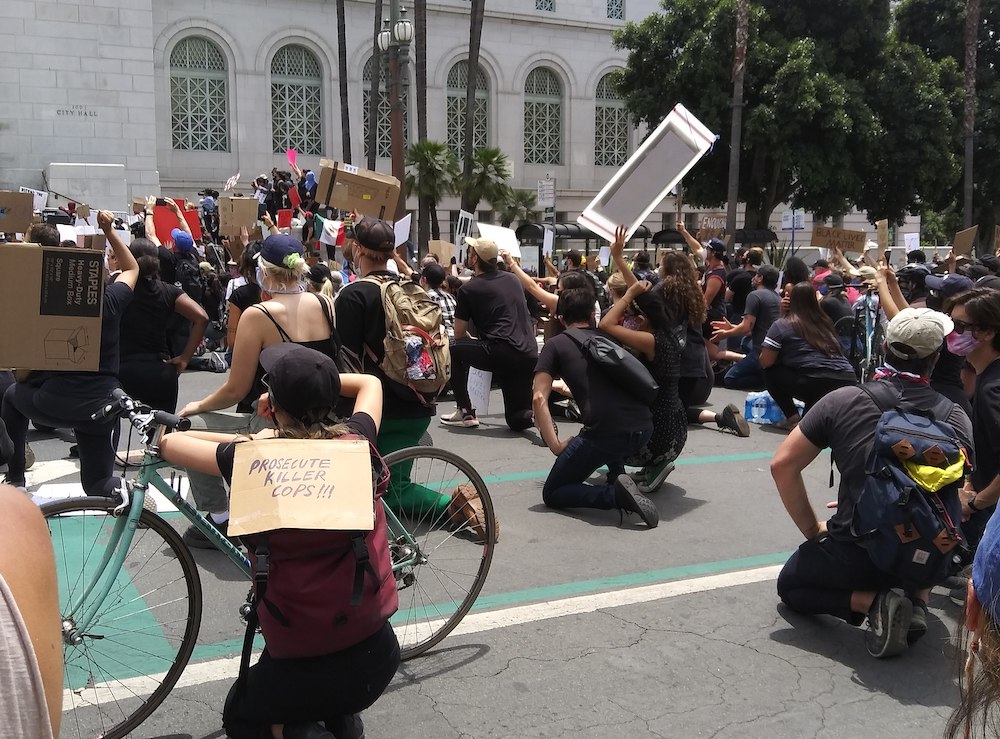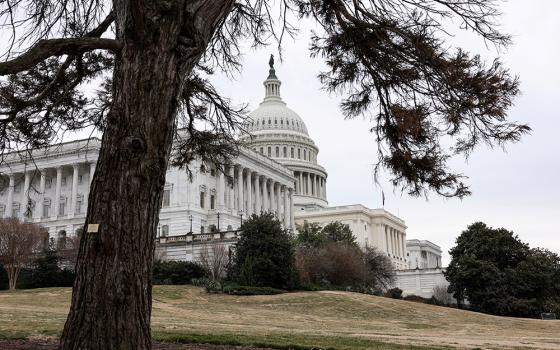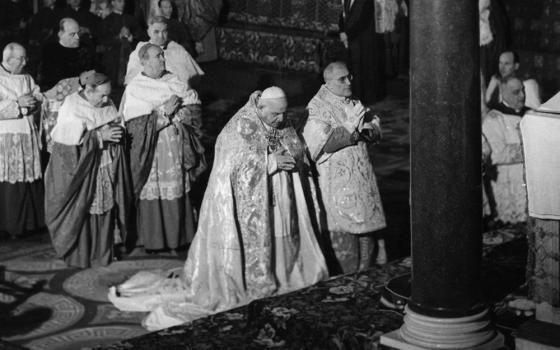
Demonstrators supporting George Floyd and protesting police brutality and killings, especially against Black people, take a knee at City Hall in Los Angeles, for "Blackout Tuesday," June 2 (Wikimedia Commons/Kriddl)
"Taking a knee." It has become the practice of some Black football players and other Black athletes to "take a knee" during the playing of the U.S. national anthem, "The Star-Spangled Banner," honoring our nation's flag at the beginning of sports events. Since its prophetic inception by Colin Kaepernick in 2016, the practice has stirred tremendous controversy on the national stage and has brought fiery criticism from the White House, questioning the patriotism of these athletes.
I would like to offer a distinctively Catholic interpretation of this practice, looking at its cultural context and causes through the hermeneutical lens of the Catholic sacramental tradition.
Catholics have a longstanding practice of genuflecting, or taking a knee, in the presence of the Blessed Sacrament in the tabernacle. The real presence of Jesus summons our reverence, which we express in the humble gesture of genuflection. By extension, our sacramental tradition summons our reverence for all creatures created in God's image, most especially our human brothers and sisters.
The flag we venerate symbolizes a nation founded on the belief that all human beings are created equal and are endowed by their creator with unalienable rights. But let's step back for a moment: What the Declaration of Independence actually stated was that "all men are created equal." From the beginning, it excluded women, and in its final form it functioned to exclude men and women of color. In effect, "all men" meant "all white men."
It was written by Thomas Jefferson, a white man who owned 600 Black slaves across the span of his life, with over a hundred at any given time. Scholars point out that Jefferson actually condemned slavery in his initial draft of the declaration, but that condemnation did not make it into the final version ratified by Congress. Yet, even though Jefferson's original intent was to include Black men and slaves in the expression "all men," his subsequent silence, his own continuing practice of slavery, and later letters endorsing the economic benefits of slave labor all effectively rendered that original intention null and void. Tragically, in the 21st century, while we typically replace "all men" with "all people," Black people are still not equally included.
Advertisement
Indeed, our national structures have not functioned to treat people of every race, ethnicity, gender, and orientation as equal. Most specifically, our national structures have functioned in very concrete ways to denigrate, exploit and marginalize Blacks and other people of color. We have not lived up to the values symbolized by our nation's flag, and we who are white, we are who are the beneficiaries of white privilege, are being summoned anew in our age to repent.
Let's take another look at what it means to "take a knee" in the presence of our nation's flag, and at the singing of the national anthem that extolls it. Could taking a knee mean genuflecting in reverence for what the flag symbolizes, and in lament for all the ways our nation has failed to live up to its most noble values? Values like the right to life, liberty and the pursuit of happiness? For all?
Could "taking a knee" symbolize the highest degree of faithfulness to those values by protesting all that desecrates them? Could taking a knee symbolize commitment to act on behalf of all who have been denied equal access to the rights affirmed by the Constitution and symbolized by the flag? Could it be that those of us who profess faith in Jesus Christ, and who are white beneficiaries of a system that has long since proven to be unequal and unjust, are being summoned to "take a knee" alongside our Black brothers and sisters?
Next time we hear the national anthem and witness the raising of the flag, let's reverently, prayerfully and mournfully "take a knee." Let's genuflect before the passion of Christ that our Black brothers and sisters have endured at the hands of a nation that has betrayed its own ideals. And then let's get up and work for the changes that will promote the flourishing and wellbeing of all those who are not yet deemed equal in the American cultural, economic and political system. Such humble, reverent genuflection will require genuine soul-searching. It will require those of us who have long benefitted, however unknowingly, from our condition of white privilege to embark on a journey of conversion. It is a journey that will require not only prayer, but deep study of the history of the African American experience, beginning with the history of slavery; deep study of the many movements leading up to and following upon the civil rights movement; and close, contemplative attention to and participation in the Black Lives Matter movement.
Humble, reverent genuflection before the image of God in our Black brothers and sisters, and before the highest ideals symbolized by our nation's flag, if authentic, will lead us to journey in the footsteps of Jesus in response to the signs of these times.
[Kathleen McManus is a Dominican Sister of Blauvelt, New York, and former associate professor of systematic theology at the University of Portland. She is currently engaged in theological scholarship and consultation and has written extensively on Christology, theological anthropology and the theology of suffering. She is completing a book entitled Suffering and the Vulnerable Rule of God: A Feminist Epistemology.]






